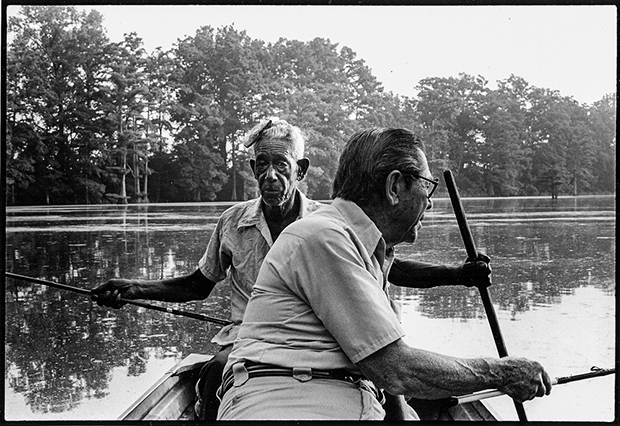Search this site
Memories from an Arkansas Cotton Farm in the 1980s

Cheryl with Silos, Rotan Switch, Arkansas

Cully Cooking, Rotan Switch, Arkansas
When she was a girl, photographer Lisa McCord spent summers and holidays at Rotan, her grandparents’ Arkansas cotton farm. Some of her earliest memories are of singing Sweet Jesus, Carry Me Home and praying at her nanny Cully’s church. She remembers her cooking and spending time with her on hot, humid days.
The artist’s parents were both teenagers when she was born, and they moved frequently- thirteen times throughout her childhood. Rotan was always there, and McCord credits this place and these people with helping to raise her.
“I began documenting life on my grandparents’ cotton farm in 1978 when I was twenty-one,” she writes in her artist statement. “After forty years, I have come to realize all my photographs taken here are explorations of home, an idea that remains firmly rooted in the Arkansas land and people. I’ve also come to realize that the place I call home is not perfect.
“Rotan Switch takes its name from the community’s central landmark – the railroad switch where farmers loaded their cotton bales onto trains headed out of the Delta. Although it hasn’t been used in years, it remains a potent symbol of the complex intersections of industry and agriculture, of race and injustice.
“These photographs are complicated; they exist in the context of the socioeconomic structures of the rural South. Although the subjects are family to me, as a white photographer and the granddaughter of a landowner, my photographs of the Black community implicate my own role in reinforcing these power structures. In a community in which most people spend their time working or caring for children, my ability to observe and document in itself has been a position of privilege.
“The images are coupled with my own memories as well as reflections by the people in the photographs. These images are a record of my story of Rotan and the Arkansas Delta, a story that is specific to me and my family’s role in a place where inequities exist to this day. I have done my best to acknowledge this complicated history.”
Most of the people in the photographs she visited at home, at church, and in cafes were longtime friends who had known her as a child, or in Cully’s case, had been an integral part of her girlhood.
McCord attended Williams Elementary School in Little Rock in the 1950s, the same decade the Little Rock Nine made history in Arkansas by enrolling in the previously segregated Little Rock Central High School. She would later move on to parochial school and later a private boarding school.
In college, she made Super 8 films with her brother and Cully’s daughter Cheryl on the playground of her youth. “I felt more comfortable cooking with Cully and hanging out with Cheryl than I did in the social situations with my grandparents and their friends and grandchildren,” she says. While her own grandmother sometimes grew impatient with the camera, Cully, her husband James, and Cheryl invited the young photographer into their world.
As McCord grew up, the negatives she had from Rotan took a backseat for decades until at last she was able to return to them. Looking back, she was moved not only by their personal value but also their historical implications. Representation and inclusion—and the acknowledgement of injustice in America—have remained at the forefront of her mind as she’s revisited these images. She published the book Rotan Switch, immortalizing her early years and the people who shaped, loved, and cared for her.
Rotan itself is still there, managed in part by McCord’s cousin Jonathan. The family farm grows cotton, along with rice, milo, soybeans, and wheat. McCord visits when she’s able. Cully and James have since passed away, but Cheryl has prints from the book, featuring her parents when they were young and in love.

A Humid Day, Rotan Switch, Arkansas

James and TBo, Rotan Switch, Arkansas

James and Cully Kissing, Rotan Switch, Arkansas

Cully Sewing, Rotan Switch, Arkansas

Frances and Child, Rotan Switch, Arkansas

Frances with Children, Rotan Switch, Arkansas

Tang with Children, Rotan Switch, Arkansas

Cully’s Cafe 1, Rotan Switch, Arkansas

Cully’s Cafe 2, Rotan Switch, Arkansas

Granddaddy and Sank Fishing, Rotan Switch, Arkansas

Sunday School, Rotan Switch, Arkansas
All images © Lisa McCord